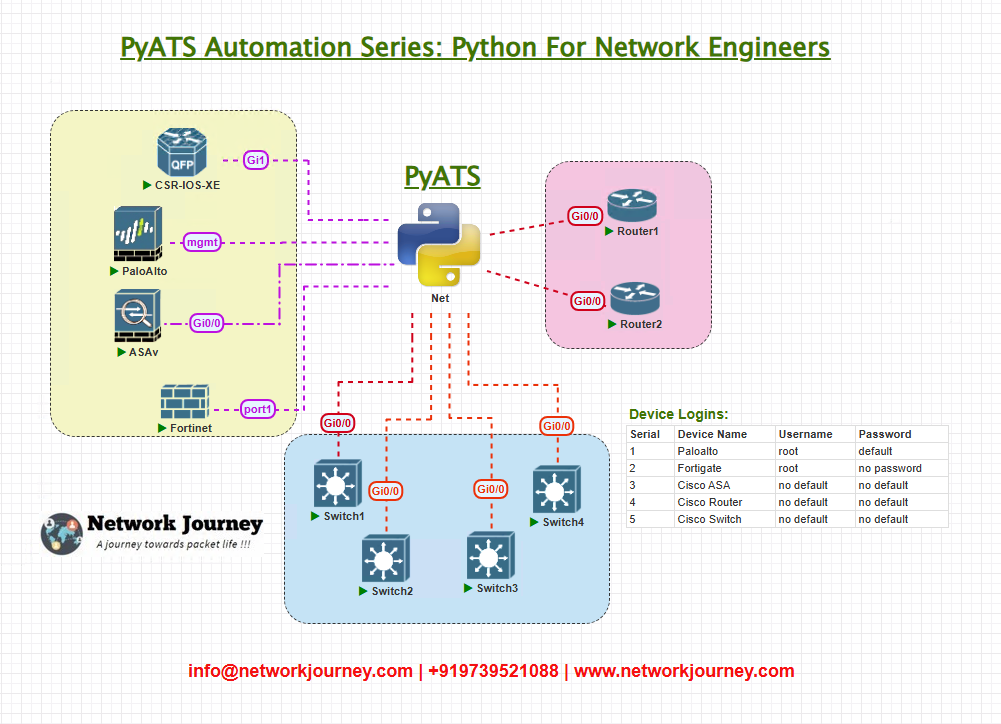[Day #31 PyATS Series] Detect VLAN Mismatches on Trunk Links Using pyATS for Cisco [Python for Network Engineer]
Table of Contents
Introduction
Detecting VLAN mismatches on trunk links is crucial for maintaining seamless Layer 2 connectivity across a network. A VLAN mismatch can lead to traffic drops, inconsistent broadcast domains, and ultimately network instability. Traditional troubleshooting involves manually logging into each switch and comparing trunk configurations—a slow, error-prone process.
In today’s 101 Days of pyATS (Vendor-Agnostic) series, Trainer Sagar Dhawan demonstrates how to automate VLAN mismatch detection using pyATS. This tutorial is designed for Python for Network Engineer learners who want to:
- Automate trunk VLAN validation across Cisco switches
- Quickly identify mismatches and misconfigurations
- Scale VLAN consistency checks to large enterprise networks
- Generate structured, actionable reports
By the end of this guide, you’ll have a reusable pyATS solution that can integrate into CI/CD pipelines for proactive VLAN health monitoring.
Topology Overview
Our network consists of three Cisco switches connected via trunk links:
- Switch1 trunk to Switch2
- Switch2 trunk to Switch3
- VLANs 10, 20, and 30 should be consistently allowed across all trunks.

Topology & Communications
- Protocol: 802.1Q trunking
- Authentication: Configured in
testbed.yml - Execution: CLI connections via SSH
Steps:
- Connect to each switch.
- Run
show interfaces trunkcommand. - Parse allowed VLANs and operational trunk state.
- Compare VLAN lists between neighbor switches.
Workflow Script
from genie.testbed import load
import json
def get_trunk_vlans(device):
device.connect(log_stdout=False)
output = device.parse('show interfaces trunk')
device.disconnect()
trunks = {}
for iface, details in output['interface'].items():
allowed = details.get('vlans_allowed', '')
trunks[iface] = allowed
return trunks
def compare_vlans(device_trunks):
mismatches = []
devices = list(device_trunks.keys())
for i in range(len(devices) - 1):
d1, d2 = devices[i], devices[i+1]
for iface1, vlans1 in device_trunks[d1].items():
for iface2, vlans2 in device_trunks[d2].items():
if vlans1 != vlans2:
mismatches.append({
'device_pair': f"{d1}-{d2}",
'interfaces': f"{iface1}-{iface2}",
'vlans': f"Mismatch: {vlans1} vs {vlans2}"
})
return mismatches
if __name__ == "__main__":
testbed = load('testbed.yml')
devices = testbed.devices
trunk_data = {}
for name, device in devices.items():
print(f"Collecting trunk VLANs from {name}...")
trunk_data[name] = get_trunk_vlans(device)
mismatches = compare_vlans(trunk_data)
with open('vlan_mismatch_report.json', 'w') as f:
json.dump(mismatches, f, indent=4)
print(json.dumps(mismatches, indent=4))
Explanation by Line
- get_trunk_vlans function: Connects to each switch, runs
show interfaces trunk, extracts allowed VLANs per trunk interface. - compare_vlans function: Compares VLANs on trunk interfaces between adjacent switches to identify mismatches.
- Main block: Loops through switches, collects trunk VLAN info, and generates a mismatch report.
testbed.yml Example
testbed:
name: vlan_mismatch_test
devices:
Switch1:
os: iosxe
type: switch
connections:
cli:
protocol: ssh
ip: 192.168.101.1
credentials:
default:
username: admin
password: cisco123
Switch2:
os: iosxe
type: switch
connections:
cli:
protocol: ssh
ip: 192.168.101.2
credentials:
default:
username: admin
password: cisco123
Switch3:
os: iosxe
type: switch
connections:
cli:
protocol: ssh
ip: 192.168.101.3
credentials:
default:
username: admin
password: cisco123
Post-validation CLI Screenshots (Expected Output)
Switch1:
Switch1# show interfaces trunk Port Vlans allowed on trunk Gi0/1 10,20,30
Script Output:
[
{
"device_pair": "Switch1-Switch2",
"interfaces": "Gi0/1-Gi0/1",
"vlans": "Mismatch: 10,20,30 vs 10,20"
}
]
8. FAQs
1. Can this script detect VLAN pruning differences on trunk links?
Yes. The script compares the allowed VLANs on each trunk interface and flags any discrepancies, including cases where VLANs are pruned on one side but not the other.
2. Does this solution handle VLAN ranges like 10-20 automatically?
Yes. pyATS Genie parsers normalize VLAN ranges into explicit VLAN lists, enabling accurate comparisons of trunk configurations.
3. How does the script identify which interfaces are trunk links?
The script uses the parsed output from show interfaces trunk, which lists all interfaces configured as trunks and their allowed VLANs.
4. Is it safe to run VLAN mismatch checks during production hours?
Yes. The script only executes read-only commands and does not modify any VLAN or trunk configurations on the devices.
5. Can I scale this validation for dozens of switches?
Absolutely. pyATS supports connecting to multiple devices concurrently. By adding more devices to testbed.yml, you can scale the validation to large networks.
6. How can I visualize and track VLAN mismatches over time?
You can store the JSON output in a monitoring tool or database, and visualize VLAN mismatch trends using dashboards like Grafana or Kibana.
7. Will this script work for non-Cisco network devices?
With appropriate parsers or vendor-specific show commands, the script can be extended to Arista, Palo Alto, Fortinet, and other multi-vendor environments.
8. Can this be extended to automatically correct VLAN mismatches?
Yes. With additional automation logic, you can standardize VLAN configurations and push corrections via pyATS or Ansible playbooks to resolve mismatches automatically.
YouTube Link
Watch the Complete Python for Network Engineer: Detect VLAN mismatches on trunk links using pyATS for Cisco [Python for Network Engineer] Lab Demo & Explanation on our channel:
Join Our Training
Automating VLAN mismatch detection saves hours of manual troubleshooting and prevents costly outages. Trainer Sagar Dhawan offers a 3-month instructor-led program teaching Python, Ansible, APIs, and Cisco DevNet for Network Engineers. Gain hands-on experience with pyATS to automate VLAN checks and more.
Join Our Training to advance your career and master Python for Network Engineer skills.
Enroll Now & Future‑Proof Your Career
Email: info@networkjourney.com
WhatsApp / Call: +91 97395 21088
![[Day #31 PyATS Series] Detect VLAN Mismatches on Trunk Links Using pyATS for Cisco [Python for Network Engineer]](https://networkjourney.com/wp-content/uploads/2025/08/Day-31-PyATS-Series-Detect-VLAN-Mismatches-on-Trunk-Links-Using-pyATS-for-Cisco.png)
![[Day #54 Pyats Series] NETCONF validation for Cisco/Arista/Paloalto/Fortigate using pyATS for Cisco [Python for Network Engineer]](https://networkjourney.com/wp-content/uploads/2025/08/NETCONF-validation-for-Cisco-Arista-Paloalto-Fortigate-using-pyATS-for-Cisco.png)
![[Day #66 PyATS Series] DHCP Lease Monitoring Across Vendors Using pyATS for Cisco](https://networkjourney.com/wp-content/uploads/2025/09/Day-66-PyATS-Series-DHCP-Lease-Monitoring-Across-Vendors-Using-pyATS-for-Cisco-470x274.png)
![[Day #18 Pyats Series] Building test case hierarchy with Section, CommonSetup using pyATS for Cisco](https://networkjourney.com/wp-content/uploads/2025/07/Building-test-case-hierarchy-with-Section-CommonSetup-using-pyATS-for-Cisco.png)